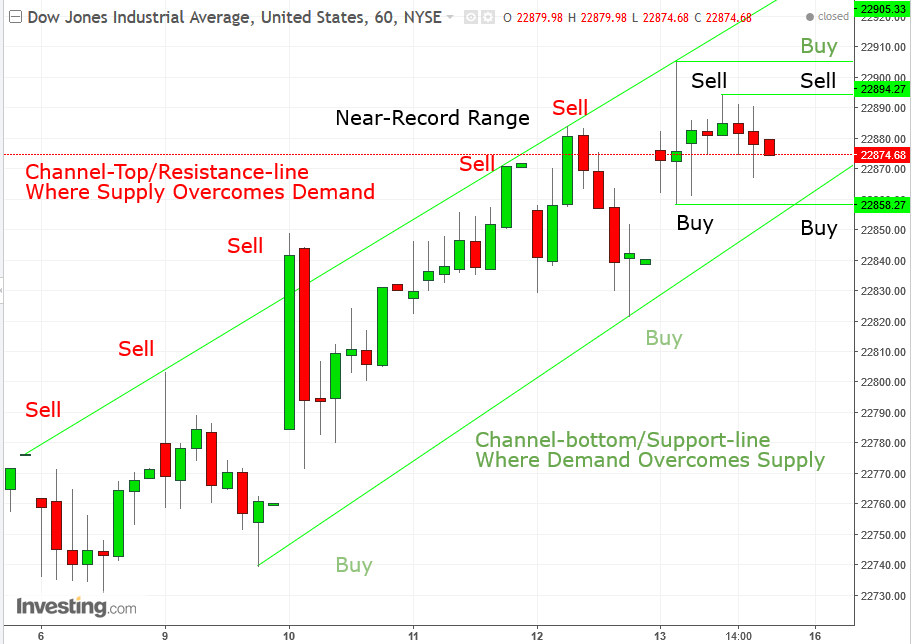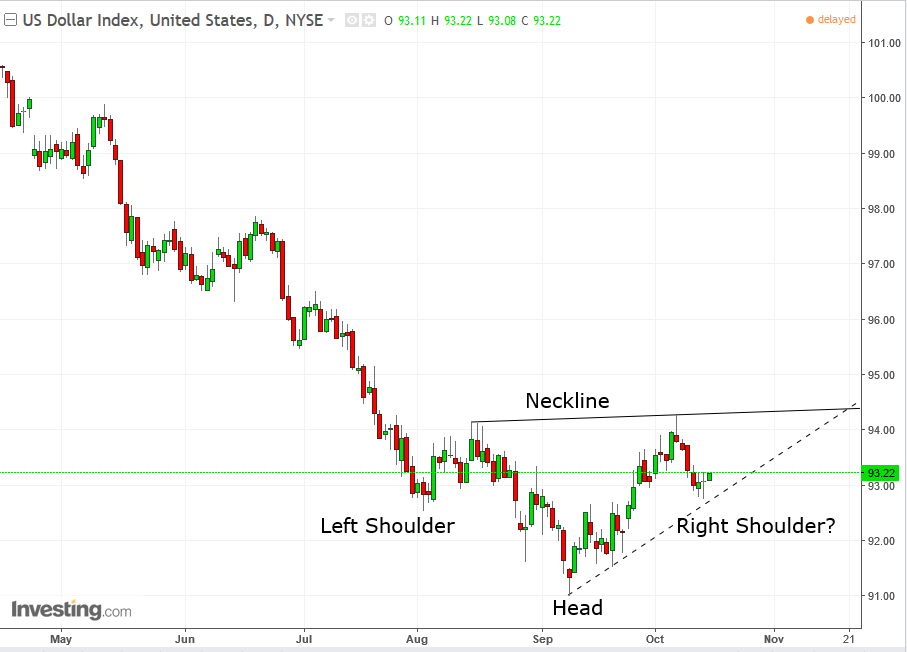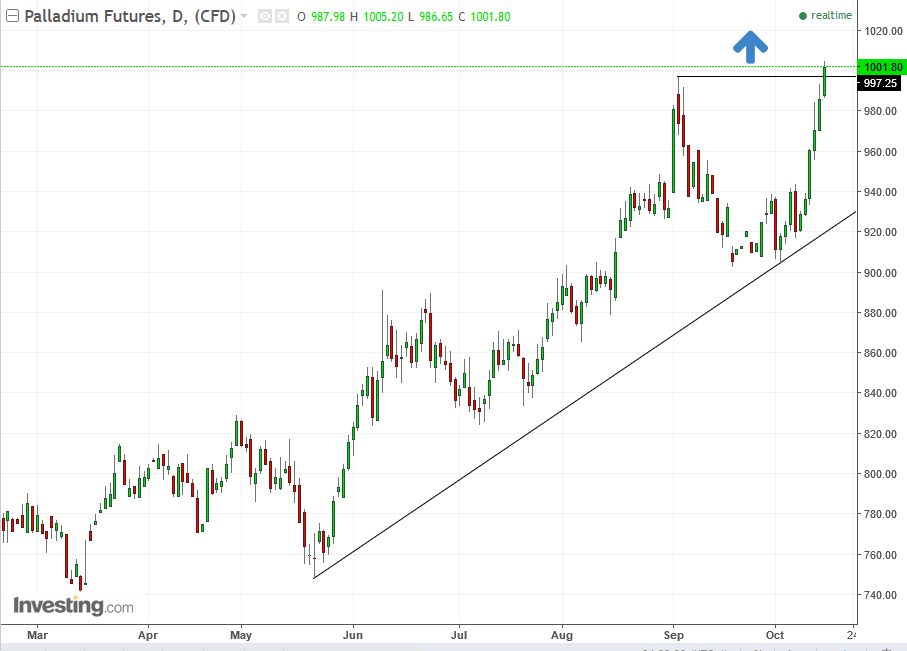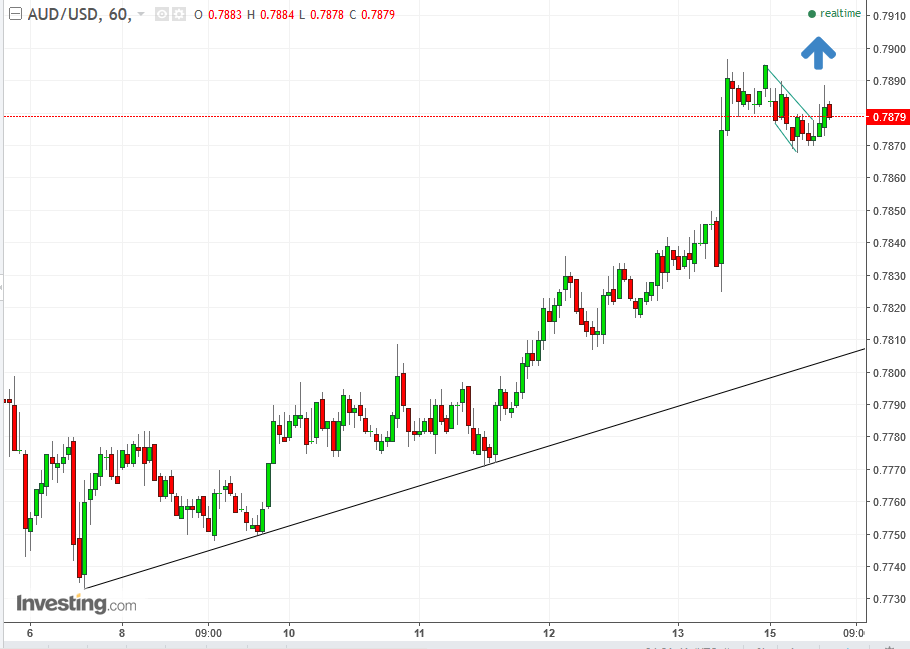by Pinchas Cohen
Key Events
- CPI rise 0.5% in September, the largest jump in eight months
- Yellen bets on the dollar
- Metals boosted by global growth, China in particular
- But is China growth sustainable?
- Geopolitical risk endures via Germany, Catalonia and Austria

US stock indices, including the Dow which hit an intraday high, made fresh records on Friday, after the consumer price index rose 0.5% in September, the second straight and largest jump in eight months. As a rule, rising prices paint a picture of a growing economy. If businesses make more money, they can expand, including by hiring more employees and giving more and better raises to existing employees.
As a result, the new and old employees pay more taxes and have more money to spend, thus helping expand the economy. This creates a positive upward trajectory for everyone involved in the economic cycle.
While on the face of it this should then be bullish news, we've also been cautioning that there will be higher inflation because of the rebuilding necessary after the extensive damage wrought by Hurricane Harvey. Furthermore, the hurricane’s inflation boost fell short of expectations, so that the core CPI reading (which excludes prices subject to high volatility, such as food and energy) missed estimates for a sixth month. However, we have also been warning that data will be volatile and confusing and hard to read until the hurricane effect is cleared.
Still, we’re counting on the fact that ever since the surprise Brexit referendum outcome on June 24, 2016, equity traders have been keen to rely on bullish news while conveniently disregarded bearish news. As such, we forecast last Friday's CPI result will have a positive impact on US as well as global equity markets in the short-term.
Global Financial Affairs
The dollar gained today, after Federal Reserve Chair Janet Yellen said yesterday at the G30 International Banking Seminar that her “best guess” is consumer prices—aka the data that measures inflation—will soon accelerate after a period in which both economists and traders have been continuously surprised by the lack of growth. Yellen’s assessment was backed up by European Central Bank President Mario Draghi and Bank of England Governor Mark Carney.
Higher inflation will require the Fed to increase interest rates, as a way to control rising inflation. Otherwise, inflation will grow too fast, leading the economy up too fast, which would cause a bubble followed by a crash.
Higher interest rates mean that dollar holders will have a better payout for holding the dollar.

As a result the dollar rose this morning. Should it remain on course, it will complete a bottom, with a minimum 3-percent rally. A breakout above the 95.00 level would also complete a head-and-shoulders bottoming pattern, showing how the downtrend turned around, into an uptrend.

The concerted, optimistic growth outlook among the world's top bankers increased demand for copper, sending it to its highest level in more than three years. Palladium—used in pollution-control devices for gasoline-powered vehicles—broke through the psychological round $1,000 level for the first time since 2001.
Another boost to metals came from China’s producer prices which hit a 6-month high. Yet another piece of evidence supporting global inflation.

The Australian dollar jumped after the release, on expected higher exports to its biggest trading partner.
However, yields on China’s 10-year bonds spiked to their highest close since April 2015 after traders dumped them in response to PBoC Governor Zhou Xiaochuan’s warning that Chinese companies have taken on too much debt. The warning, released on the heels of the PPI upside surprise, suggests the country’s expansion may be relying on debt rather than a winning business plan. The Chinese Central Bank Governor’s remarks may also set the stage for what’s to follow at the Communist Party Congress later this week.
Geopolitical Risks Remain In Play
After last year's Brexit vote, European markets were subject to considerable uncertainty, as a eurosceptic wave enveloped Europe. In contrast, this year Europe has, until recently, been enjoying a kind of a golden period, with the euro a safe haven, while political instability has rocked the US.
However, September's German election demonstrated that the populist movement has not disappeared on the continent. The German far-right AfD party established itself as the country's third largest bloc, sending Chancellor Angela Merkel—who lost 20-percent of her support post-election—scurrying to form a tenable coalition. This week, Merkel heads into talks to form a national government, after her Christian Democratic party was further weakened by a defeat in Lower Saxony on Sunday.
Austria's right wing parties appear to have also made significant gains, with preliminary results beginning to be released after that country's parliamentary election yesterday.
Meanwhile, 1,000 miles southwest, the Spanish separatist drama continues. After delaying a declaration of independence, Catalonia’s President Carles Puigdemont appeared to have defended his region’s claim to independence late last week. Political analysts forecast this course of action will provoke retaliation from the Spanish government which will likely take steps to suspend Catalan self-rule within days.
6,344 miles to the east, the US and South Korea begin a five-day joint military drill involving both country's naval and air forces, in response to North Korea’s provocation that another missile launch could be underway. Pyongyang has characterized the drill as a “reckless act of war maniacs.”
Up Ahead
- Chinese President Xi Jinping gives the opening speech at the 19th Communist Party Congress in Beijing on Wednesday.
- Early Thursday morning (late Wednesday night US), China releases GDP, Industrial Production and Retail Sales data.
- U.S. economic data this week will include September housing reports including Building Permits, Housing Starts and Existing Home Sales. Results will probably show the negative effects on demand of Hurricanes Harvey and Irma.
- Netflix (NASDAQ:NFLX) reports Q3 2017 earnings today, after the close, but the real story may not be in the results.
- Earnings season gets into full swing as the week progresses: major U.S. financial firms including Morgan Stanley (NYSE:MS) and Goldman Sachs Group (NYSE:GS) report on Tuesday. General Electric (NYSE:GE), whose beaten down stock can't seem to catch a break reports on Friday.
- Bank of England Governor Mark Carney appears before the U.K. Parliament’s Treasury Committee for the first time since June’s election on Tuesday.
Market Moves
Stocks
- Japan’s TOPIX advanced 0.6 percent at the close in Tokyo and Australia’s S&P/ASX 200 Index rose 0.6 percent. South Korea’s KOSPI climbed 0.3 percent.
- Hong Kong’s Hang Seng Index was 0.6 percent higher, while the Shanghai Composite slipped 0.4 percent.
- Euro Stoxx 50 Futures fell slightly in early European trading.
- Contracts on the S&P 500 Index were little changed. The underlying gauge gained 0.2 percent last week.
- The MSCI Asia Pacific Index rose 0.6 percent, its highest level since November 2007.
- The MSCI All-Country World Equity Index reached a record high.
Currencies
- The Dollar Index was up 0.14 percent. It is now 0.54 percent higher than Friday’s low, in what may turn out to be a right shoulder on a H&S bottom, after having fallen 10.2 percent since its January high at the apex of the Trump Trade, paring losses from its 12.3-percent decline in early September.
- The yen was at 111.78 per dollar after climbing 0.4 percent on Friday.
- The euro fell 0.3 percent to $1.1787.
- This morning the Aussie bought 78.81 U.S. cents.
Bonds
- Australia’s 10-year yield fell four basis points to 2.75 percent.
- US 10-year yields rose two basis points to 2.29 percent. It had fallen five basis points on Friday.
- The yield on 10-year German bunds gained one basis point to 0.41 percent.
Commodities
- WTI crude oil climbed 1 percent to $51.96 a barrel, extending the commodity's gains. There is mounting speculation about potential supply disruptions in the oil-rich Kirkuk region as fighting between Kurdish and Iraqi forces escalates after the recent Kurdish independence referendum passed overwhelmingly. This area is home to Iraq’s oldest producing oil fields which explains why the Iraqi government isn't necessarily supportive of the vote's outcome.
- Gold was little changed at $1,303.75 an ounce.
- Copper in Shanghai rallied to the highest since April 2013. On the London Metal Exchange, the red metal burst through $7,000 a metric ton, reaching its highest intraday level since 2014.
